July 27, 2011
Written by C.N.
Recent Books & Articles on Islam & Muslim Americans
The recent mass murder tragedy in Norway has once again focused attention on ongoing sociological issues related to Islam in general and Muslim Americans in particular. As we approach the 10th anniversary of the 9/11 attacks, the debate and controversy surrounding the present and future dynamics of Muslim-west relations will only intensify. With this in mind, the following news articles and recently-released books shed more light on these important issues facing not just Muslim Americans, but all of U.S. society and indeed, the entire world.
Difference Between a Christian and Muslim Terrorist
This graphic (I found it on Digg.com but am not sure who the creator of it is) caught my attention and I think makes a powerful statement about how criticism of religious extremism seems to differ according to which religion is implicated:
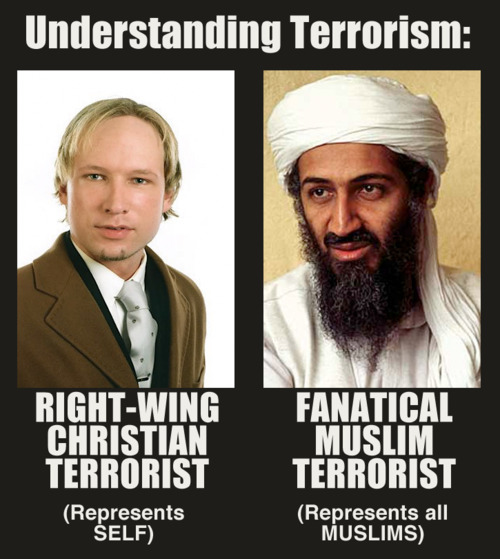
Muslim-Western Tensions Persist
As the 10th anniversary of the 9/11 attack approaches, new data from the Pew Research Group shows that unfortunately, tensions and suspicions still exist between the west and Muslim populations.
Muslim and Western publics continue to see relations between them as generally bad, with both sides holding negative stereotypes of the other. . . . However, the latest Pew Global Attitudes survey finds somewhat of a thaw in the U.S. and Europe compared with five years ago. A greater percentage of Western publics now see relations between themselves and Muslims as generally good compared with 2006.
In contrast, Muslims in predominantly Muslim nations are as inclined to say relations are generally bad as they were five years ago. And, as in the past, Muslims express more unfavorable opinions about Christians than Americans or Europeans express about Muslims. Muslims in the Middle East and elsewhere who say relations with the West are bad overwhelmingly blame the West. However, while Americans and Europeans tend to blame Muslims for bad relations, significant numbers believe Westerners are responsible.
Mistaken for Muslims, Sikhs Hit by Hate Crimes
A suspected hate crime in Sacramento CA tragically highlights the inability (or refusal) of some Americans to distinguish between Asian ethnic and religious groups and instead, blindly acting on racist stereotypes to attack innocent Americans.
The traditional [Sikh] headwear might have singled them out late last week when they were gunned down, one fatally, in what police are investigating as a suspected hate crime. On Monday, local religious leaders pleaded for the community to come forward with leads but also said they will not be deterred by violence.
“Our community will continue to wear our turbans proudly,” said Navi Kaur, the granddaughter of Surinder Singh, 65, who died from his wounds. His friend, 78-year-old Gurmej Atwal, remains in critical condition. They were walking through their neighborhood in Elk Grove, just south of the California state capital Sacramento, Friday afternoon when someone in what witnesses described as a pickup truck opened fire.
Monday also marked the start of a trial involving a confirmed hate crime against a Sikh. . . . [Amar Shergill] is the attorney for a Sikh cab driver beaten four months ago by passengers who shouted anti-Islamic slurs at him in West Sacramento, which sits across the Sacramento River from the state capital. The two defendants pleaded no contest Monday to felony assault.
As the 10th anniversary of the Sept. 11 attacks approaches, several people at Monday’s news conference drew links between the Sacramento-area crimes and national and international developments. From unrest in North Africa to congressional hearings on radicalization of Muslims in the U.S., speakers warned of an increasingly hostile climate.
Arabic One of the Fastest-Growing Language Courses at U.S. Colleges
Student enrollment in Arabic, Korean and Chinese classes is showing the fastest growth among foreign language courses at U.S. colleges, even though Spanish remains the most popular by a huge margin, a new study shows.
The survey of more than 2,500 colleges and universities by the Modern Language Assn., or MLA, found that enrollment in Arabic surged by 46% between 2006 and 2009. More U.S. college students are studying Arabic than Russian, a change that officials say reflects a shift of interest from Cold War concerns to current issues involving the Middle East and terrorism.
American Muslims Ask, Will We Ever Belong?
Last year’s controversy about the location of a Muslim center near Ground Zero has many American Muslims exasperated about if and when they will ever be fully accepted into mainstream U.S. society.
For nine years after the attacks of Sept. 11, many American Muslims made concerted efforts to build relationships with non-Muslims, to make it clear they abhor terrorism, to educate people about Islam and to participate in interfaith service projects. They took satisfaction in the observations by many scholars that Muslims in America were more successful and assimilated than Muslims in Europe.
Now, many of those same Muslims say that all of those years of work are being rapidly undone by the fierce opposition to a Muslim cultural center near ground zero that has unleashed a torrent of anti-Muslim sentiments and a spate of vandalism. . . . Dr. Ferhan Asghar, an orthopedic spine surgeon in Cincinnati and the father of two young girls [says], “In no other country could we have such freedoms — that’s why so many Muslims choose to make this country their own. But we do wonder whether it will get to the point where people don’t want Muslims here anymore.”
Behind the Backlash: Muslim Americans After 9/11, by Lori Peek (Temple University Press)
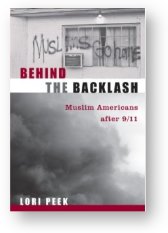
As the nation tried to absorb the shock of the 9/11 attacks, Muslim Americans were caught up in an unprecedented wave of backlash violence. Public discussion revealed that widespread misunderstanding and misrepresentation of Islam persisted, despite the striking diversity of the Muslim community.
Letting the voices of 140 ordinary Muslim American men and women describe their experiences, Lori Peek’s path-breaking book, Behind the Backlash presents moving accounts of prejudice and exclusion. Muslims speak of being subjected to harassment before the attacks, and recount the discrimination they encountered afterwards. Peek also explains the struggles of young Muslim adults to solidify their community and define their identity during a time of national crisis.
Behind the Backlash seeks to explain why blame and scapegoating occur after a catastrophe. Peek sets the twenty-first century experience of Muslim Americans, who were vilified and victimized, in the context of larger sociological and psychological processes. Peek’s book will be of interest to those in disaster research studies, sociology of religion, and race and ethnic relations.
Muslims in Motion: Islam and National Identity in the Bangladeshi Diaspora, by Nazli Kibria (Rutgers University Press)
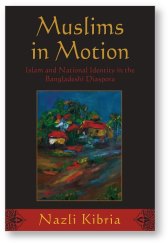
In Muslims in Motion, Nazli Kibria provides a comparative look at Bangladeshi Muslims in different global contexts-including Britain, the U.S., the Middle East, and Malaysia. Kibria examines international migrant flows from Bangladesh, and considers how such migrations continue to shape Islamization in these areas. Having conducted more than 200 in-depth interviews, she explores how, in societies as different as these, migrant Muslims, in their everyday lives, strive to achieve economic gains, sustain community and family life, and realize a sense of dignity and honor.
Muslims in Motion offers fresh insights into the prominence of Islam in these communities, especially an Islam defined by fundamentalist movements and ideologies. Kibria also focuses on the complex significance of nationality-with rich analyses of the diaspora, the role of gender and class, and the multiple identities of the migrants, she shows how nationality can be both a critical source of support and also of difficulty for many in their efforts to attain lives of dignity. By bringing to life a vast range of experiences, this book challenges prevailing stereotypes of Muslims.
Framing Muslims: Stereotyping and Representation after 9/11, by Peter Morey and Amina Yaqin (Harvard University Press)
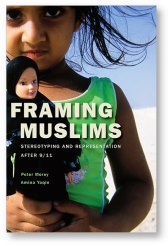
Can Muslims ever fully be citizens of the West? Can the values of Islam ever be brought into accord with the individual freedoms central to the civic identity of Western nations? Not if you believe what you see on TV. Whether the bearded fanatic, the veiled, oppressed female, or the shadowy terrorist plotting our destruction, crude stereotypes permeate public representations of Muslims in the United States and western Europe. But these “Muslims” are caricatures—distorted abstractions, wrought in the most garish colors, that serve to reduce the diversity and complexity of the Muslim world to a set of fixed objects suitable for sound bites and not much else.
In Framing Muslims: Stereotyping and Representation after 9/11, Peter Morey and Amina Yaqin dissect the ways in which stereotypes depicting Muslims as an inherently problematic presence in the West are constructed, deployed, and circulated in the public imagination, producing an immense gulf between representation and a considerably more complex reality. Crucially, they show that these stereotypes are not solely the province of crude-minded demagogues and their tabloid megaphones, but multiply as well from the lips of supposedly progressive elites, even those who presume to speak “from within,” on Muslims’ behalf.
Based on nuanced analyses of cultural representations in both the United States and the UK, the authors draw our attention to a circulation of stereotypes about Muslims that sometimes globalizes local biases and, at other times, brings national differences into sharper relief.
Patriot Acts: Narratives of Post-9/11 Injustice, by Alia Malek (McSweeneys Publishing)
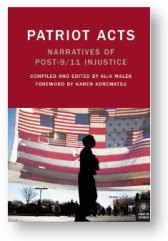
This book seeks to tell the life stories of the innocent men and women who have been needlessly swept up in the “war on terror.†As we approach the ten-year anniversary of 9/11, this collection of narratives gives voice to the people who have had their human rights violated here in the U.S. by post-9/11 policies and actions.
Among the narrators:
Young men of Arab, Muslim, South Asian, and Middle Eastern descent, who were arrested and detained or singled out for voluntary interviews because of their national origin or religion. Scholars who have been blacklisted or subjected to interrogation for their research or writings on Islam and related topics. Muslim women who have suffered from job discrimination, harassment, and assault for wearing a veil or similar head covering.
= = = = = = = = = =
UPDATE
After this post was published, I came across a few more noteworthy articles on Islam and Muslim Americans:
More Muslim Americans Believe They Are Thriving
Muslim Americans are now more optimistic about their lives than any other major American faith group as their economic well-being improves and they feel more politically enfranchised. A Gallup study released on Tuesday found 60 percent of Muslim Americans surveyed reported they were “thriving”, slightly higher than for Americans of any other religion except for Jews, who edged them out of the top spot by one percentage point.
Pollsters noted in particular the rapid surge in positive sentiment among Muslim Americans. The percentage of Muslims who were “thriving” grew by 19 points since 2008, double that of any other major faith group. . . .
Authors of the study said they attributed the change in outlook to improved economic conditions and a sense of more political enfranchisement since the election of President Barack Obama, a Christian with Muslim family roots who has reached out to Muslim communities worldwide. The report said Obama’s approval rating among Muslim Americans was 80 percent, and that 46 percent, or a plurality, of Muslim Americans identified as Democrats, compared to only 9 percent who identified as Republicans.
[I]mprovements in Muslim sentiment came despite continuing controversies. Those included a controversy surrounding a plan to build a Muslim cultural center and mosque near the site of New York’s September 11 al-Qaida attack, and hearings on Islamic extremism called by U.S. Representative Peter King, which critics viewed as a witch-hunt.
Muslim Americans Are Most Likely to Reject Violence
The same Gallup Organization study mentioned in the above article also notes that among major U.S. religious groups, Muslim Americans are the most likely to oppose individual or military violence against civilians. This particular report would be a very useful resource to contradict ongoing stereotypes that Muslims are more prone to support violence than other religious groups.
Muslim Americans are the staunchest opponents of military attacks on civilians, compared with members of other major religious groups Gallup has studied in the United States. Seventy-eight percent of Muslim Americans say military attacks on civilians are never justified. . . . Respondents from other faith groups, particularly Mormon Americans, are more likely to say military attacks are sometimes justified than never justified.
Author Citation
Copyright © 2001- by C.N. Le. Some rights reserved. 
Suggested reference: Le, C.N. . "Recent Books & Articles on Islam & Muslim Americans" Asian-Nation: The Landscape of Asian America. <https://www.asian-nation.org/headlines/2011/07/recent-books-articles-islam-muslim-americans/> ().
Short URL: https://www.asian-nation.org/headlines/?p=1765
Tags:
Translate Into Another Language![]()
